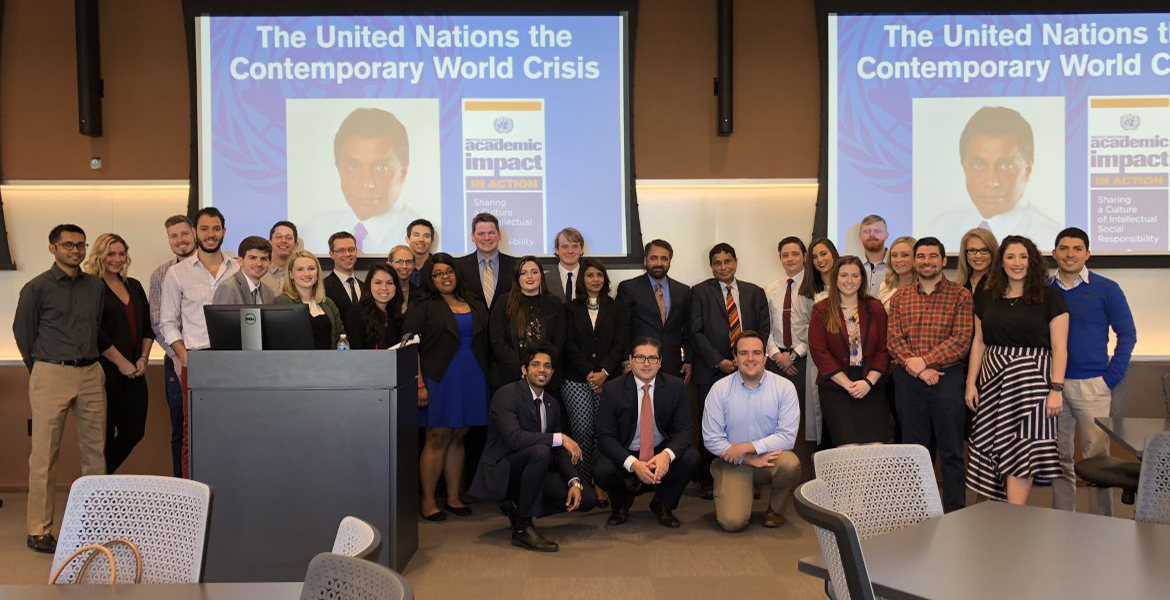
United Nations representative speaks with OSU MBA students about global impacts
Tuesday, May 1, 2018
After traveling across many states, Ramu Damodaran, chief of the United Nations Academic Impact initiative, arrived in Stillwater March 29 to speak with students. One of those stops on campus included interacting with the Oklahoma State University MBA professional development class.
The Academic Impact initiative aligns institutions of higher learning and research with the objectives of the United Nations and the United States. Damodaran came to the United Nations through India’s Foreign Service, so OSU administrators believed he would be a great representative to speak on campus with their strong ties to India.
Damodaran, an executive with varied and extensive work experience with the United Nations, was able to offer a range of business and world advice to students.
His main point includes sharing a culture of intellectual social responsibility. He also agrees with the Spears School of Business branding state – The Power of Personal. He explains that “The Power of Personal” will be important throughout a person’s career, emphasizing the importance of soft skills.
“At the end of the day, what did or did you not do to make the world a better place?” Damodara said. “This is where movements begin.”
Work to break down the wall in your mind and in others of people having a specific place. This is another way to tie in the power of personal. This could be putting yourself in another’s shoes because you have to think from another point of view.
Next, Damodaran encourages people to take everyone at face value. He explains this includes keeping civilized conversation going even if you do not believe or agree with what the other person is saying and do not allow it to overwhelm you. It also means to not let what others say bother you.
“When you are talking to someone, you are actually talking to more than one person,” Damodaran said. “You are talking to who the person believes they are, who you perceive them to be, who they are, and who influences them.”
He encourages global actions from everyone. This means linking global thoughts, and problems to your actions. These will develop into global actions.
" “At the end of the day, what did or did you not do to make the world a better place? This is where movements begin.”
When asked what global challenge he believes the students’ generation will face, he responds with apathy. He believes people will be so absorbed in their own lives that they will not worry about what is going on in the lives of others.
He also explains that the students’ generation will have difficulty finding, keeping and being happy in a job. He believes these three factors will be a great challenge.
Students were eager to listen to someone speak about global issues who has traveled the country.
“It was an informative and inspiring speech,” MBA student Grant Reeves said. “It was great to hear from someone with the knowledge to fully answer our questions from a different perspective.”
“I enjoyed his viewpoints and perspective from different areas of life,” said Imogen Schramm, MBA student. “Particularly, his passion for women rights and thinking locally really brought his topics to home.”
One of Damodaran’s many positions is deputy director for partnership and public engagement in the United Nations Department of Public Information’s Outreach Division. His duties focus on outreach to and partnerships with the non-governmental, academic and private sector constituencies, and the general public.
Damodaran is also the secretary of the United Nations Committee on Information. His previous positions include the departments of Peacekeeping and Special Political Questions, and as the Executive Office of the Secretary-General. He has served a member of the Indian Foreign Service, where he advanced to Ambassador and served as executive assistant to the Prime Minister of India.
By Taylor Mullan
